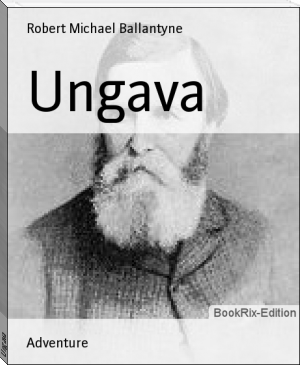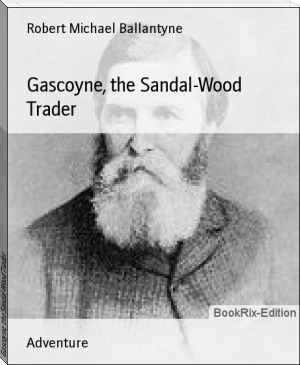Ungava by Robert Michael Ballantyne (new reading TXT) 📖

- Author: Robert Michael Ballantyne
Book online «Ungava by Robert Michael Ballantyne (new reading TXT) 📖». Author Robert Michael Ballantyne
"While we were talkin' to the Esquimau, Gaspard cries out, `I say, Prince, look here! There's a sort o' medal on this chap's neck with somethin' written on it. You're a larned fellow, Prince; see if ye can make it out.' So I looked at it, and rubbed my eyes once or twice, I can tell you, for, sure enough, there was EDITH as plain as the nose on my face."
"Oh," exclaimed Edith, smiling through her tears, "that was the medal I hung round his neck long, long ago! I hoped that it might be seen some day by people who knew me."
"I thought so, miss," returned Prince--"I thought as much, for I knew that the Esquimau could never have invented and writ that out of his own head, ye see. But Gaspard and me had most awful trouble to get him to explain how he came by it, and where he came from. Howsoever, we made out at last that he came from an island in this direction; so we just made up our minds to take the boat and come straight away for the island, which we did, takin' Annatock to pilot us."
"Then does my father not know where you are, or anything about your having heard of me?" inquired Edith, in surprise.
"Why, no, Miss Edith," replied Prince. "You see, it would have lost us two or three days to have gone back to Fort Chimo; and, after all, we thought it might turn out a false scent, and only raise your poor mother's hopes for nothin'. Besides, we were sent away for a week or two, so we knew they wouldn't wonder at our absence; so we thought, upon the whole, it would be best to come at once, specially since it was sich a short distance."
"A short distance!" repeated Edith, starting up. "I thought we must be miles and miles, oh, ever so far away! Is the distance really short?"
"Ay, that it is, little one," said Prince, patting the child on the head. "It is not more than three days' rowing from this island, and a stiff breeze on the quarter would carry us there in less than two."
"And Frank, where is Frank?" said Edith,--with a look of eager inquiry.
"Ah, miss," replied Prince, "he has been away almost as long as yourself. Soon after you were lost a packet came from the south, and he was obleeged to give up the sarch after you--though he was loath to do it--and set out with three o' the men for Moose. From that day to this we've heerd nothin' of him. But the journey he had to make was a long one--havin' to go round all the way to York Fort--so we didn't expect to hear o' him afore now. But I'll tell ye more about all your old friends when we git--things ready for a start to-morrow."
The remainder of that day was spent in making preparation for setting sail on the following morning. The first intimation of the existence of the new trading-fort had thrown the child-like natives into rapturous delight; but when Prince told them he intended to go off the next day with the child who had been as a bright spirit in their camp so long, they fell into the depths of grief. Indeed, there was manifested a slight desire to offer forcible opposition to this; but when Edith told them, through the medium of Peetoot, who acted as her interpreter, that the distance to her father's fort was not great, and that she would expect them to come often there, and stay long, they became reconciled to her departure; and when she sought to turn their minds (a work of no great difficulty at any time) away from that subject by describing to them the treasures of the trading-store, they danced and laughed and sang like very children. Even Kaga's baby crowed with a racy richness of feeling, and smiled with an oily brilliancy of expression, compared with which all its former exhibitions were mere child's play.
But when the hour of departure really came, and Edith bade farewell to her kind friends, whose rude but warm hospitality she had enjoyed so long, they were again plunged into the deepest distress; and when the little boat finally put to sea, there was not a tearless eye among the tribe, while Edith was swiftly borne from their island shore before a strong and favouring breeze.
CHAPTER THIRTY THREE.
THE CLOUDS ARE BROKEN, THE SUN BURSTS THROUGH AND ONCE MORE IRRADIATE PORT CHIMO--HOPES AND FEARS FOR MAXIMUS.
The wings of time moved slowly and heavily along at Fort Chimo. Hope long deferred, expectation frequently reviving and as often disappointed, crushed the spirits of the little party. The song, and jest, and laugh seldom sounded from the houses of the men, who went through their daily avocations almost in silence. Not only had the loss of Edith--the bright spirit of the place, the tender rosebud in that savage wilderness--cast an overwhelming gloom upon the fort, but the failure of the trade, to a great extent, had added to the general depression, and now fresh anxiety was beginning to be felt at the non-appearance of Frank Morton.
"Jessie," said Stanley one day, as he rose from the desk at which he had been writing, and put on his cap with the intention of taking a stroll along the beach, "will you come with me today? I know not how it is, but every time I go out now I expect to hear the ship's gun as it comes through the narrows."
Mrs Stanley rose, and throwing on a shawl and hood, accompanied her husband in silence.
"Perhaps," she said at length, "you expect to hear the gun because the vessel _ought_ to be here by this time."
As she spoke, La Roche came up and touched his cap. "Please, madame, vat you vill have pour dinner?"
"Whatever you please, La Roche. Repeat yesterday's," answered Mrs Stanley, with the air of one who did not wish to be troubled further on the subject. But La Roche was not to be so easily put down.
"Ah, madame! pardonnez moi. Dat is impossible. Ve have fresh fish yesterday, dere be no fresh fish to-day. More de pity. C'est dommage-- dat Gaspard him gone away--"
La Roche was interrupted by a sudden exclamation from his master, who pointed, while he gazed earnestly, towards the narrows of the river. It seemed as if the scene of last year were repeated in a vision. Against the dark rock appeared the white, triangular sail of a vessel. Slowly, like a phantom, it came into view, for the wind was very light; while the three spectators on the beach gazed with beating hearts, scarcely daring to credit their eyes. In a few seconds another sail appeared--a schooner floated into view; a white cloud burst from her bows, and once again the long, silent echoes of Ungava were awakened by the roaring of artillery. The men of the fort left their several employments and rushed to the beach to welcome the vessel with a cheer; but although it was heartfelt and vigorous, it was neither so prolonged nor so enthusiastic as it was on the first occasion of the ship's arrival.
As the vessel dropped anchor opposite the fort, Frank Morton leaped on her bow, and along with the crew returned the cheer with a degree of energy that awakened memories of other days.
"There's Frank!" cried Stanley, turning on his wife a glance of joy. "Bless the boy! It warms my heart to see him. He must have picked up some Indian woman by the way. I see the flutter of a petticoat."
As he spoke, the boat pushed off from the vessel's side, and a few rapid strokes sent it bounding towards the shore.
"Eh! what's this?" exclaimed Stanley, as his wife broke from him, and with a wild shriek rushed into the lake.
The figure of a child stood on the boat's bow, with her arms extended to the shore.
"Hurrah, lads! give way!" shouted Frank's deep voice.
"Mother! mother!" cried the child.
In another moment Frank bounded over the boat's side and placed Edith in her mother's arms!
------------------------------------------------------------------------
Reader, there are incidents in the histories of men which cannot be minutely described without being marred. Such an one was the meeting between the father and mother and their long-lost child. We refrain from attempting to draw aside the curtain further than to say that the joy and gratitude in more than one heart at Ungava found vent that night in thanksgiving to Him who can bring light out of darkness and turn sorrow into joy.
The greater part of the day was spent at the fort in that feverish excitement which cannot calm down to steady conversation, but vents itself in eager, rambling questions and abrupt replies. Meanwhile, the necessity of discharging the cargo of the vessel, and preparing the furs for shipment, served to distract the attention and occupy the hands of the whole party.
As evening advanced, La Roche, true to his duty, placed supper on the table, and Stanley and his wife, along with Edith and Frank, while they partook of the meal, continued their inquiries.
"Whereabouts was it, Frank, that you fell in with the boat?" said Stanley.
"Not more than five miles from the mouth of the river, at about six this morning. We observed the boat beset by a pretty solid pack of ice, and you may be sure we were not a little surprised when we saw the Union Jack run up to her peak; so I ordered our boat to be lowered, intending to go to her assistance. While the men were doing this, I examined her with the glass, and then it was that I found, to my amazement and inexpressible joy, that the boat contained Prince, Gaspard, and Edith."
"Ah! Frank," said Mrs Stanley, "was it not a strange providence that you, who were so sad at being compelled to give up the search, should be the one appointed to find our beloved child, and bring her back to us?"
"Nay," replied Frank, "it was not I who found her. Let me not rob Dick Prince and Gaspard of the honour and gratitude which they have nobly won."
"And what do you think of the non-arrival of Maximus?" said Stanley, whose feelings were still too much perturbed to allow him to dwell for more than a few minutes at a time on any subject. Frank shook his head.
"I know not what to think," said he. "As I have told you already, we left him at Moose Fort with his recovered bride, and we got the missionary to marry them there in due form. Next day they started in a small canoe on their return voyage to Ungava, and the day following
 Nowadays a big variety of genres are exist. In our electronic library you can choose any book that suits your mood, request and purpose. This website is full of free ebooks. Reading online is very popular and become mainstream. This website can provoke you to be smarter than anyone. You can read between work breaks, in public transport, in cafes over a cup of coffee and cheesecake.
Nowadays a big variety of genres are exist. In our electronic library you can choose any book that suits your mood, request and purpose. This website is full of free ebooks. Reading online is very popular and become mainstream. This website can provoke you to be smarter than anyone. You can read between work breaks, in public transport, in cafes over a cup of coffee and cheesecake.




Comments (0)